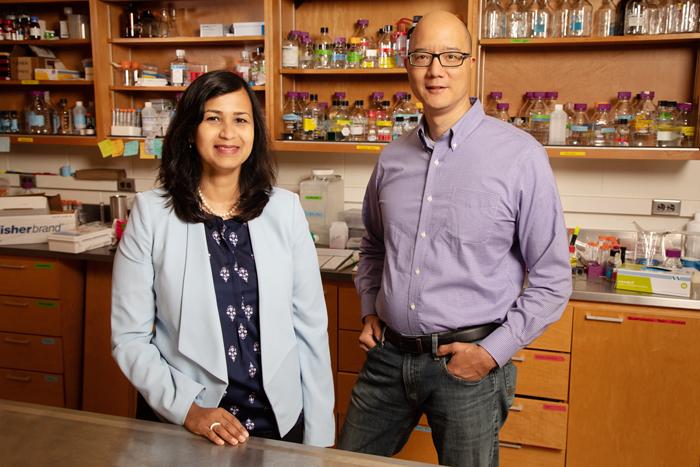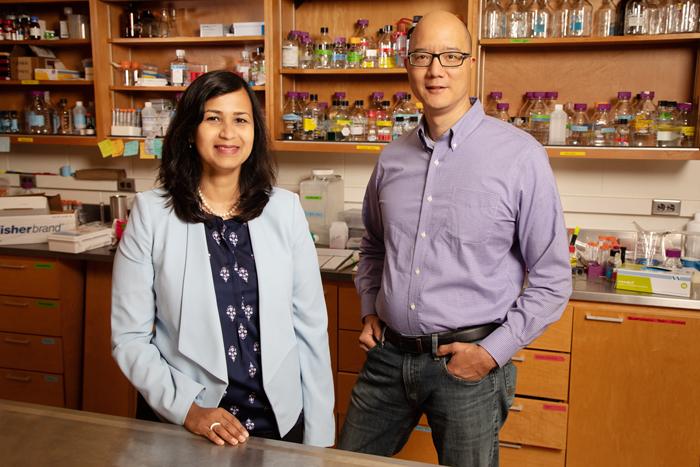
Credit: Photo by L. Brian Stauffer
CHAMPAIGN, Ill. — A class of molecules formed when the body metabolizes omega-3 fatty acids could inhibit cancer's growth and spread, University of Illinois researchers report in a new study in mice. The molecules, called endocannabinoids, are made naturally by the body and have similar properties to cannabinoids found in marijuana – but without the psychotropic effects.
In mice with tumors of osteosarcoma – a bone cancer that is notoriously painful and difficult to treat – endocannabinoids slowed the growth of tumors and blood vessels, inhibited the cancer cells from migrating and caused cancer cell death. The results were published in the Journal of Medicinal Chemistry.
"We have a built-in endocannabinoid system which is anti-inflammatory and pain-reducing. Now we see it is also anti-cancer, stopping the cells from proliferating or migrating," said study leader Aditi Das, a professor of comparative biosciences and an affiliate of biochemistry at Illinois. "These molecules could address multiple problems: cancer, inflammation and pain."
In 2017, the Illinois team identified a new group of omega-3 fatty-acid metabolites called endocannabinoid epoxides, or EDP-EAs. They found that these molecules had anti-inflammatory properties and targeted the same receptor in the body that cannabis does.
Since cannabis has been shown to have some anti-cancer properties, in the new study the researchers investigated whether EDP-EAs also affect cancer cells. They found that in mice with osteosarcoma tumors that metastasized to their lungs, there was an 80 percent increase in naturally occurring EDP-EAs in cancerous lung tissues over the lungs of healthy mice.
"The dramatic increase indicated that these molecules were doing something to the cancer – but we didn't know if it was harmful or good," Das said. "We asked, are they trying to stop the cancer, or facilitating it? So we studied the individual properties and saw that they are working against the cancer in several ways."
The researchers found that in higher concentrations, EDP-EAs did kill cancer cells, but not as effectively as other chemotherapeutic drugs on the market. However, the compounds also combated the osteosarcoma in other ways: They slowed tumor growth by inhibiting new blood vessels from forming to supply the tumor with nutrients, they prevented interactions between the cells, and most significantly, they appeared to stop cancerous cells from migrating.
"The major cause of death from cancer is driven by the spread of tumor cells, which requires migration of cells," said study coauthor Timothy Fan, a professor of veterinary clinical medicine and veterinary oncology. "As such, therapies that have the potential to impede cell migration also could be useful for slowing down or inhibiting metastases."
The researchers isolated the most potent of the molecules and are working to develop derivatives that bind better to the cannabinoid receptor, which is plentiful on the surface on cancer cells.
"Dietary consumption of omega-3 fatty acids can lead to the formation of these substances in the body and may have some beneficial effects. However, if you have cancer, you want something concentrated and fast acting," Das said. "That's where the endocannabinoid epoxide derivatives come into play – you could make a concentrated dose of the exact compound that's most effective against the cancer. You could also mix this with other drugs such as chemotherapies."
Next, the researchers plan to perform preclinical studies in dogs, since dogs develop osteosarcoma spontaneously, similarly to humans. They also plan to study the effects of EDP-EAs derived from omega-3 fatty acids in other cancer types.
"Particular cancers that might be most interesting to study would be solid tumors or carcinomas, which tend to spread and cause pain within the skeleton. Some of the most common tumors that behave this way are breast, prostate, and lung carcinomas, and we can certainly explore these tumors in the future," said Fan, who is also a member of the Carle Illinois College of Medicine, the Cancer Center at Illinois and the Carl R. Woese Institute for Genomic Biology.
###
The National Institutes of Health and the American Heart Association supported this work.
Editor's notes: To reach Aditi Das, call 217-244-0630; email: [email protected]. To reach Timothy Fan, call (217) 333-5375; email [email protected].
The paper "Antitumorigenic properties of omega-3 endocannabinoid epoxides" is available online or from the News Bureau.
DOI: 10.1021/acs.jmedchem.8b00243
Media Contact
Liz Ahlberg Touchstone
[email protected]
217-244-1073
@NewsAtIllinois
http://www.illinois.edu
Original Source
https://news.illinois.edu/view/6367/670666 http://dx.doi.org/10.1021/acs.jmedchem.8b00243





